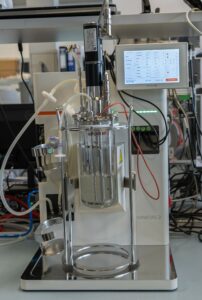Cartera Tecnológica
Production of Lactic Acid from 5C lignocellulosic sugars
 Description
Description
A Lactobacillus pentosus strain called MAX2 highly efficient in the production of LA from xylose (C5) has been obtained, also significantly increasing the productivity with respect to the parental strain. The strain is capable of efficiently fermenting lignocellulosic sugars even at low pH (acidic environment found in LA production processes) without the need for neutralizing agents.
Since xylose is the second most abundant sugar in lignocellulose, it is interesting to have microorganisms capable of efficiently transforming it into bio-based chemical products such as LA. L. pentosus CECT4023T was evolved to improve its xylose fermentation ability even at acidic pH through adaptive laboratory evolution.
The production of LA from 5C lignocellulosic sugars may replace its production by lactic fermentation from raw materials such as milk sugar (lactose), starch, grape sugar (glucose) or sugarcane (sucrose) mainly using lactic acid bacteria or from sugarcane or cassava which are always more expensive compared to lignocellulosic wastes besides the dilemma of using food feedstocks for bioproducts.
Advantages and innovation
-
The developed new strain MAX2 represents an important advance compared to what already exists:
- Increase between 1.5 and 2 times xylose consumption and LA production than the parental strain in synthetic medium regardless of the initial pH value.
- Productivity of LA at 16 h increased 1.4 times when MAX2 was grown in both synthetic media with xylose and lignocellulosic hydrolyzate with a controlled pH.
- It reduces the need to use neutralizing agents in the process.
Lignocellulose fermentation with the new strain MAX2 can be carried out in existing facilities, so investments in equipment are not necessary and operating costs decrease due to the reduction of neutralizing agents.
Market applications
Production of Lactic Acid from 5C lignocellulosic sugars
Contact
Cristina González Fernández, Cristina.gonzalez@imdea.org

